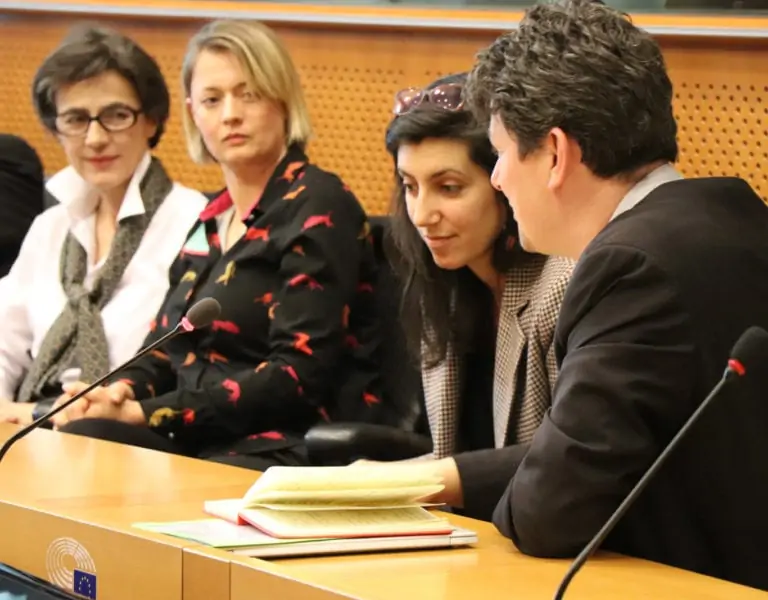STANDING UP FOR THE SELF-EMPLOYED
Kurt Brazda, chair of IMAGO’s Working Conditions Committee, and Dr. Cristina Busch, specialist copyright and media lawyer and the Committee’s legal advisor, explain why the EU’s move to enable competition and antitrust law collective bargaining for solo self-employed people in the arts, culture and creative industries has been welcomed by IMAGO.
The EU Commission, as the supreme guardian of competition law, has bitten the bullet. Its Collective Bargaining for Self-Employed Guidelines have allowed solo self-employed to collectively negotiate their fees, so the strict antitrust law no longer applies to them.
Often, European umbrella organisations such as IMAGO (supported by EUXXL, an independent platform serving European creatives) have made this requirement in Brussels because it is so important, especially for those working in the audio-visual industry. With these guidelines, the Commission has now reacted to the evolving digital world of work in the 21st century, and much faster than we thought possible.
But why is this so important for our industry?
Fortunately, fixed-term employment is still the norm in the production of cinema films and TV series (and this is not about to change!). However, this form of employment is no longer compatible with the current requirements in documentary film, news, and more. A grey area has developed here in recent years, characterised by poor working conditions, underpayment, and self-exploitation. It is primarily young colleagues who must make ends meet here as solo self-employed workers, with precarious work and the risk of poverty being inevitable. The only way to get a job is often by undercutting one another in a fiendish competition between the weak and the weak that leaves everyone behind.
So far there is no protection under labour law for the self-employed, although they are just as dependent, if not more so, than employees. Minimum fees from collective agreements do not apply to them; as weak individuals, contracts from clients such as television stations, film production companies, platforms, publishers, etc. are simply dictated to them.
The Commission guidelines show a way out here. Solo self-employed are no longer seen as entrepreneurs in the classic sense, but as a steadily growing group of dependants for whom a corrective labour law must be found. The first essential step in this direction is fair payment, which can now be negotiated collectively. Trade unions and professional associations in the member states of the European Union are required to act here. The repeatedly overused argument that “competition law prohibits self-employed people from fixing prices” was coldly used by companies to play off people against each other.
With this push by the EU, this cynical approach should be permanently undermined. Although the UK is regrettably no longer a member of the EU, it is an indispensable member of the European family. The British unions, with their well-known strong solidarity force, could use the guideline as an opportunity to protect the self-employed as well. However, it is now up to us via our professional representatives, trade unions and professional associations to pick up the ball as soon as possible. All these organisations must be open to the self-employed and represent them in all labour law matters. Of course, there are still hurdles to be overcome, but the path is clearly marked. For the creation of a decent working environment for all and the future of our young colleagues we must take responsibility in solidarity!
–
The EU has paved the way for collective bargaining for the self-employed by adopting “Guidelines on the application of Union competition law to collective agreements regarding the working conditions of solo self-employed persons” C(2022), 6846 final.
But those who place their hopes solely in the EU have already lost.
It is important to know that the choice of legal instrument (‘guidelines’ are so-called “soft law”) means the approach to an inclusive, non-discriminatory collective bargaining for the self-employed to achieve better payment and different working conditions cannot have an immediate result.
Another problem is that the EU doesn’t seem aware of the special characteristics of our sector: many solo self-employed people in the arts and culture sector fall outside the ‘grid’ of the guidelines. Recital 24 claims that “a solo self-employed person is in a situation of economic dependence where that person earns, on average, at least 50% of total work-related income from a single counterparty, over the period of either one or two years.” Crew often work as solo self-employed on behalf of several clients on the one hand and as employed workers on the other so apparently, they cannot benefit from the EU initiative.
But this does not prevent national professional associations, which must be representative for their special sector, and constituted legally, to demand to enter negotiations with the counterparty.
Here’s the problem: Collective bargaining not only restricts competition, as correctly pointed out in several parts of the guidelines, but also usually restricts the profits of the other parties. So, an unequal interest in concluding collective bargaining exists. Currently, it seems mechanisms have not yet been implanted at EU or national level to oblige the counterpart to negotiate. The guidelines themselves do not offer any solution.
It should be noted that Article 28 of the EU Charter of Fundamental Rights recognises the fundamental character of the right of collective bargaining and action to workers and employers, or their respective organisations. It has been discussed for a long time about applying those fundamental rights to solo self-employed too; the decisive factor should not be whether there is an employment relationship, but whether there is a bargaining imbalance. Unfortunately, the Guidelines do not position itself, although it mentions this existing controversy.
Professional associations for the solo self-employed in the arts, media and creative industries should, among other things, urge the legislator to provide a legal basis for collective agreement between unions or professional associations and the corresponding counterpart, which is the only way that any solo self-employed can claim those rights.
In contrast to many European countries, there is still an extended conviction in Great Britain that the collectivisation of interests and the compensation of individual inferiority through association is a powerful instrument. Europe take inspiration from the UK’s strong existing movement in order to take advantage of the EU’s recent change of paradigm.
There’s a lot to do – let’s get on with it!










